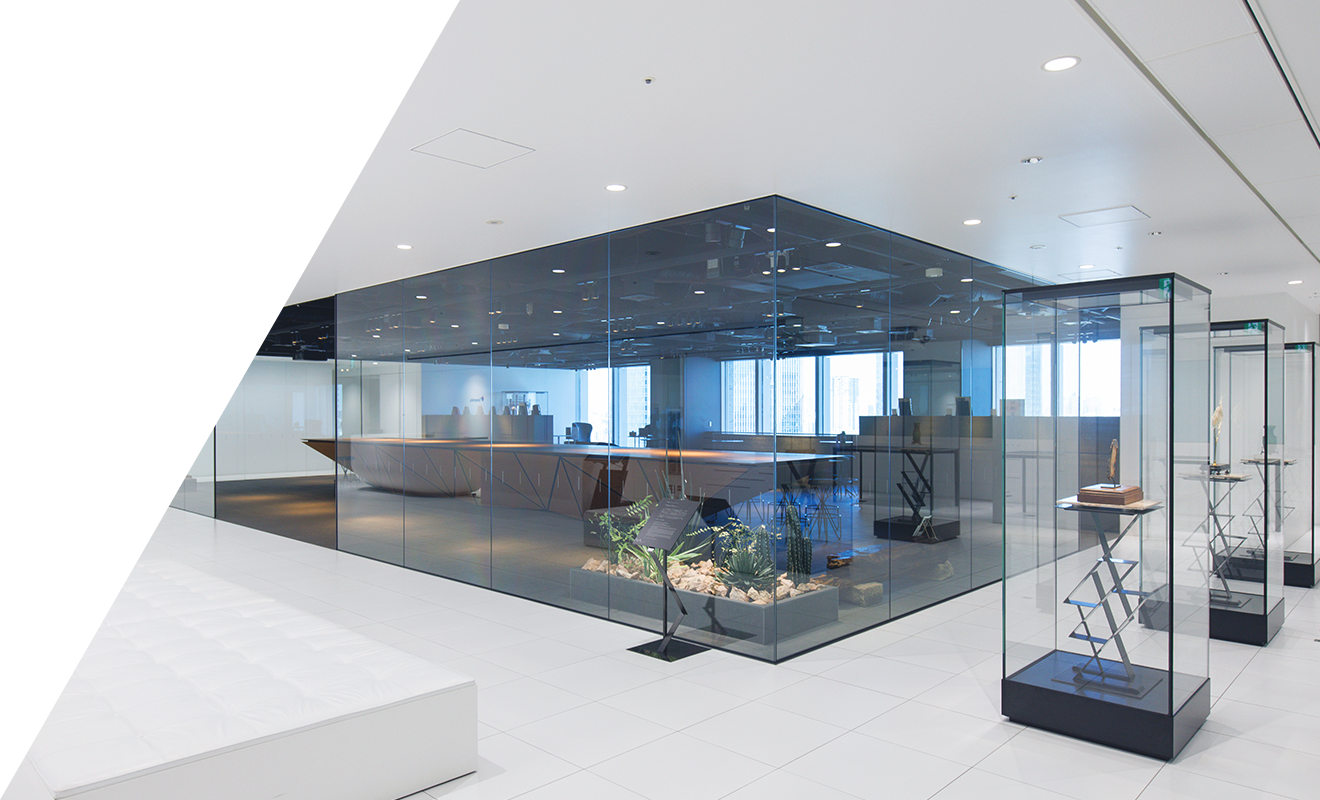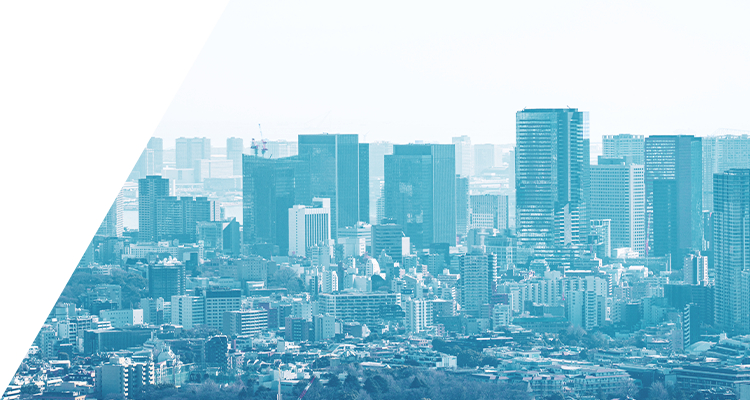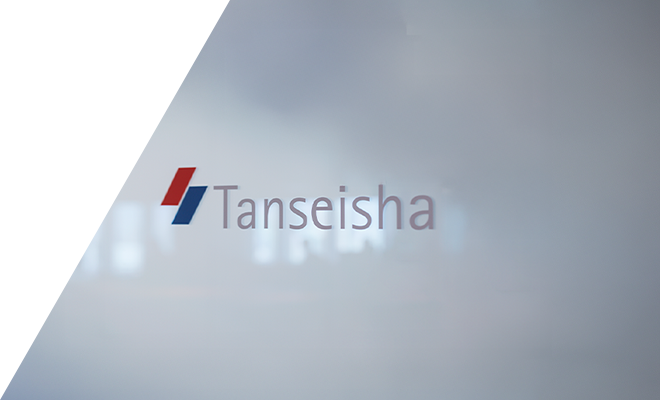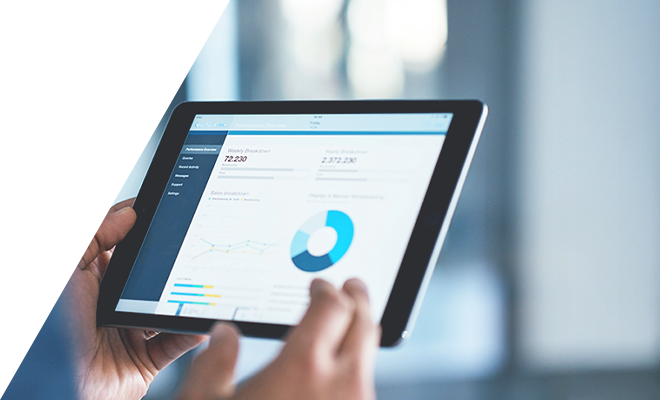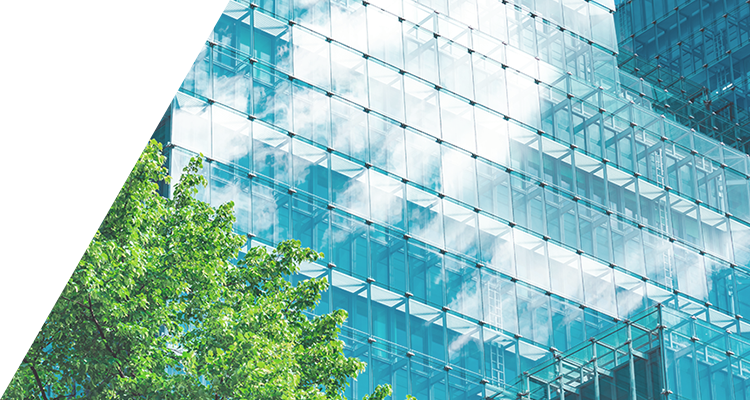Site Search
Respect for humanity
We respect human rights and diversity, and pursue human happiness. We provide spaces and experiences that "inspire" a wide variety of users, and we create an organizational culture where diverse employees respect each other, make use of their various perspectives, knowledge, and know-how, and an environment where each individual can grow and thrive.
- TOP
- Sustainability
- Respect for humanity
Tanseisha Group Human Rights Policy
Basic Approach to Respecting Human Rights
The Tanseisha Group's Sustainability Policy, formulated in accordance with Purpose, states, "The Tanseisha Group is committed to continuously enhancing its corporate value and contributing to the realization of a colorful and sustainable society by addressing environmental and social issues through its business of creating valuable spaces and working diligently to resolve them. The company also states that it will "contribute to the realization of a colorful and sustainable society. In addition, the Tanseisha Group Code of Conduct states "Respect for Human Rights and Prohibition of Discrimination," and the Tanseisha Group will fulfill its responsibility to respect the human rights of all stakeholders involved in its business.
In formulating this policy, it was submitted to and approved by the Management Committee of Tanseisha and resolved at the Director meeting.
Tanseisha Group Human Rights Policy
- Compliance with international standards and laws related to human rights
We will conduct business activities based on the United Nations Guiding Principles on Business and Human Rights, and will support and respect international norms regarding human rights, such as the International Bill of Human Rights, the International Labor Organization's (ILO) Declaration on Fundamental Principles and Rights at Work, Children's Rights and Business Principles, and the Ten Principles of the United Nations Global Compact, while also complying with applicable laws and regulations in the countries and regions in which we conduct business.
Furthermore, when we are faced with a conflict between internationally recognized human rights standards and local laws, we will adhere to the higher standard and seek ways to respect international human rights standards. - Scope
This policy applies to all directors and employees of the Tanseisha Group (including seconded and temporary employees).
We also expect our business partners, including cooperating companies, and everyone involved in our business activities to understand, support, observe, and practice respect for human rights and diversity in accordance with this policy, and we aim to work together with them on this initiative. - Priority themes for respecting human rights
- Prohibition of discrimination and harassment
In order to respect human rights and diversity, we will not tolerate any discrimination, harassment or unfair treatment on the grounds of nationality, race, ethnicity, religion, ideology, sex, age, disability, gender identity, sexual orientation, employment status or any other reason. - Prohibition of child labor and forced labor
We will not engage in any form of child labor, forced labor, or human trafficking, nor will we engage in any human rights violations against foreign workers, etc. - Respect for fundamental labor rights
We respect fundamental labor rights, including freedom of association, as well as the right of workers to organize and the right to collective bargaining. In addition, we maintain and promote healthy and favorable labor-management relations through dialogue and discussion with employees or their representatives. - Appropriate payment of wages and management of working hours
In accordance with applicable laws and regulations, we will comply with the legal minimum wage and strive to pay a living wage or higher. We will also prevent long working hours and manage working hours appropriately. - Ensuring a safe working environment
We will consider the mental and physical health and safety of our employees, strive to create a comfortable and rewarding working environment, and ensure occupational safety and health. - Support for achieving work-life balance
We understand the importance of work-life balance for each employee, and we will promote initiatives that allow employees to choose from a variety of work styles to achieve both productivity and improved well-being. - Promoting Diversity, Equity & Inclusion (DE&I)
We will work to create a workplace and climate that respects different cultures, customs, and values, and strive to improve diversity so that each employee can grow and play an active role regardless of race, nationality, gender, etc. In addition, we will respect the human rights of vulnerable people who are easily alienated from society or whose human rights are violated, such as people with disabilities, foreign workers, and sexual minorities (LGBTQ, etc.), and work to support and provide relief for such people's independence. - Respecting the rights of indigenous peoples and local communities
We will respect the rights and cultures of indigenous peoples and local residents as stipulated in the laws and international agreements of the countries and regions in which we conduct our business. - Protection of personal information and respect for privacy
We will comply with relevant laws, regulations and other standards when handling personal information, and will work to protect the personal information and respect the privacy of all people involved in our business activities.
- Prohibition of discrimination and harassment
- Governance and Promotion Structure for Human Rights
Human rights initiatives are promoted mainly by the Sustainability Promotion Division, Human Resources and Labor Relations Division, and Supply Chain Management Division. The Sustainability Committee, chaired by President and Chief Executive Officer, is positioned within the governance structure. After regular discussion and deliberation, important matters are discussed and decided by the Executive Committee and reported to the Director meeting, thereby strengthening governance and reducing risk to management. - Human Rights Due Diligence Initiatives
We will establish a human rights due diligence system in accordance with the United Nations Guiding Principles on Business and Human Rights, identify any adverse impacts on human rights that may arise in the course of our business activities, and work to prevent and mitigate such impacts. - Corrective Actions and Remedies
If it becomes clear that the business activities of the Tanseisha Group have caused, contributed to, or contributed to adverse impacts on human rights, we will take appropriate measures to remedy or remedy the situation.
Furthermore, even if the Tanseisha Group itself does not directly contribute to adverse human rights impacts, if the Tanseisha Group's partner companies or other related parties are directly connected to adverse human rights impacts through their business, products or services, we will strive to prevent and mitigate those impacts.
We will set up a consultation desk through our corporate website etc. for all people involved in the business activities of the Tanseisha Group and operate it appropriately. With regard to reports and consultations received, we will thoroughly manage the privacy of the whistleblower and related parties and the information on the report, and protect the whistleblower from being treated disadvantageously as a result of having made a report. - Dialogue and consultation with stakeholders
We will continue to engage in dialogue and discussions with relevant internal and external stakeholders regarding the identification of actual and potential impacts on human rights and responses to improve them. - Education and Training
We will provide appropriate education and training to the directors and employees of the Tanseisha Group so that this policy is understood, established in our business activities, and effectively implemented. We will also promote activities to ensure that our business partners, including our cooperating companies, understand this policy. - Information Disclosure
We will disclose our human rights initiatives based on this policy on our corporate website and other means, and strive to ensure that our stakeholders understand them.
Established on February 1, 2025
President and Chief Executive Officer Osamu Kobayashi
Initiatives for creating space
We have developed the "Sustainable Design Guidelines," which outline our efforts to promote "sustainable design," a design methodology for realizing a sustainable society, and are working to solve social issues through the creation of a variety of spaces.
Sustainable Design [Respect for People]
- (1) We provide a space that "moves hearts" by deepening understanding of a diverse range of users.
- (2) We will consider ways to make the space easy to use and safe for everyone to experience.
- (3) We strive to maximize people's well-being through creating spaces.
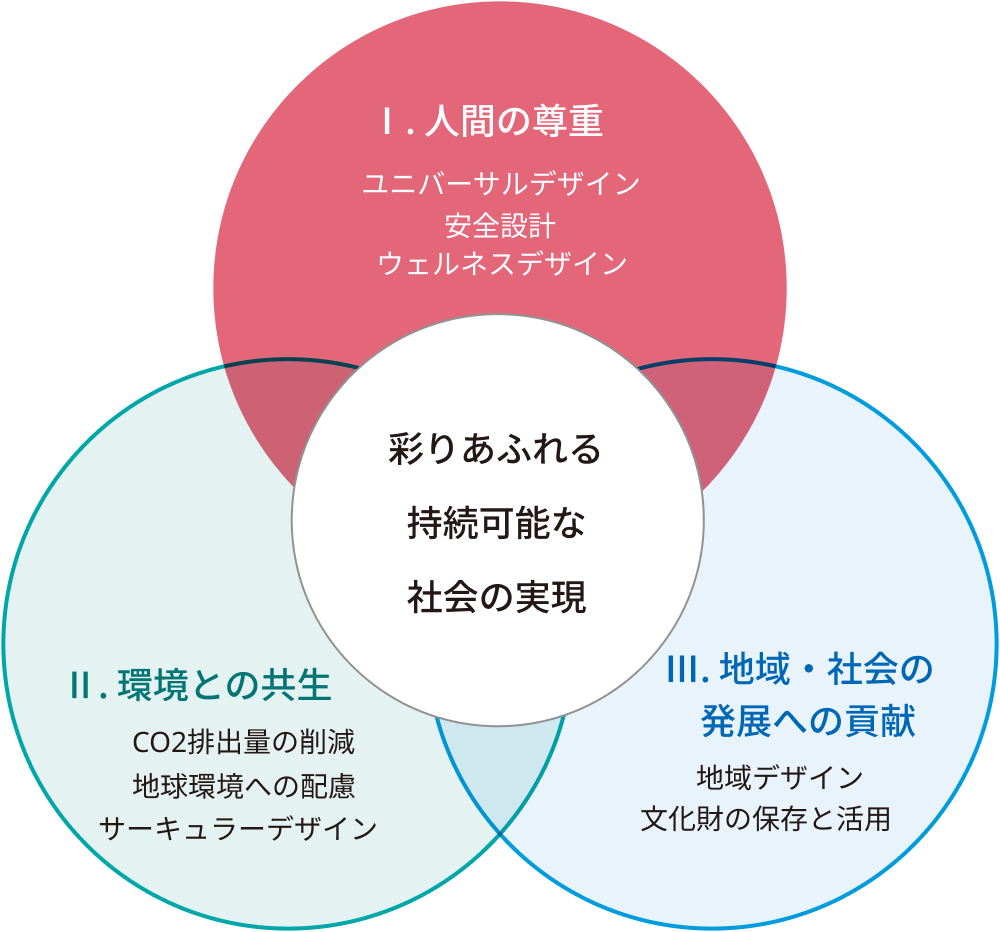
Initiative Themes
(1) Universal design (2) Safety design (3) Wellness design
Promoting Universal Design
In addition to universal design in terms of both soft and hard aspects, we strive to practice "universal design of the heart."
Since 2018, we have partnered with Mirairo Co., Ltd., a company that specializes in universal design consulting, to create facilities that incorporate universal design.
In addition, we have developed a multilingual app called "T-VOIX" that uses UV codes * to provide information translated into various languages in text and audio in offline environments, and we are working to have this app adopted by cultural facilities throughout Japan.
Additionally, we are continually collecting information about universal design and sharing it on our company intranet.
UV code: Uni-Voice, a speech code developed by the Japan Association for Visually Impaired Information Service (JAVIS), a non-profit organization.
Examples of achievements
"Ikei Pharmacy Yanaka Store"
Together with Mirairo Co., Ltd., a universal design consulting company, we carried out on-site surveys and verifications, aiming to create a space that took into consideration the width of the aisles, the wheelchair space in the waiting area, the dimensions and shape of the prescription counter, and the location of assistants. In addition, in the lobby, we placed bookshelves that also function as partitions at a height that can be easily used by people of all ages, from children to the elderly. In the sales corner, we also installed a counseling counter and beauty salon booths to help people become truly healthy.
(Owner: Sun IM Planning Co., Ltd. | Scope of work: architectural and interior Basic Planning, design, Basic Layout, logo and business card design, Total Design supervision, furniture, store signs, and tower clock construction)
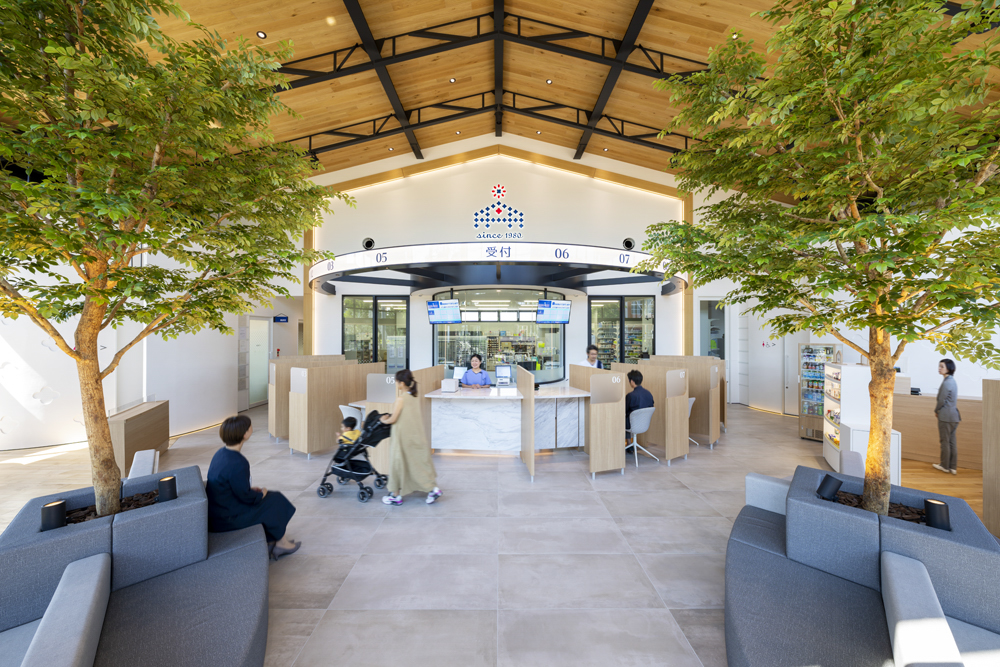
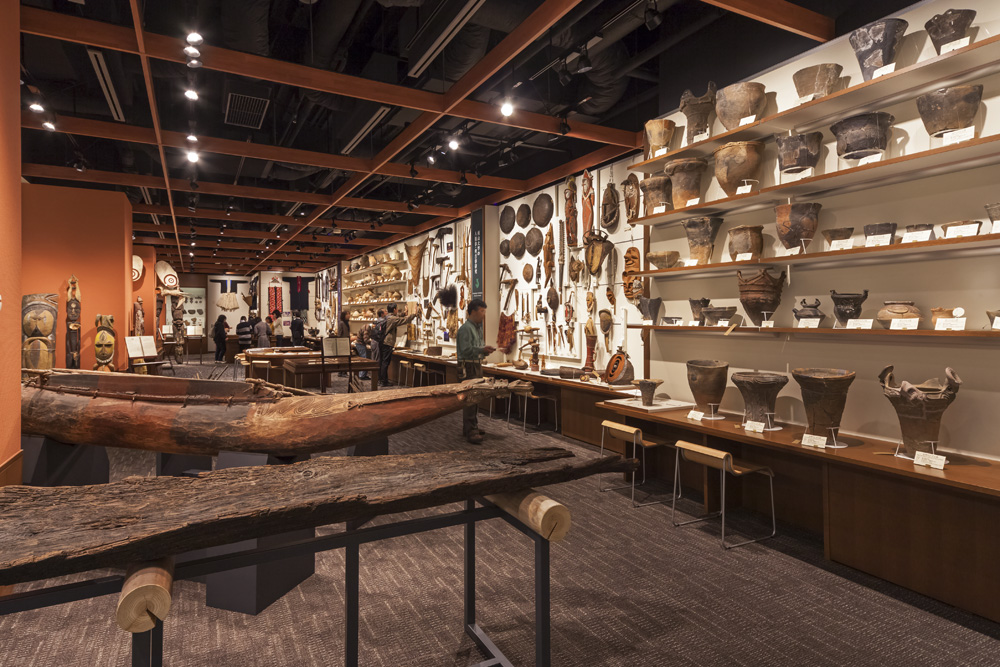
Nanzan University Museum of Anthropology
A museum where you can touch and enjoy all the exhibits
Learn more
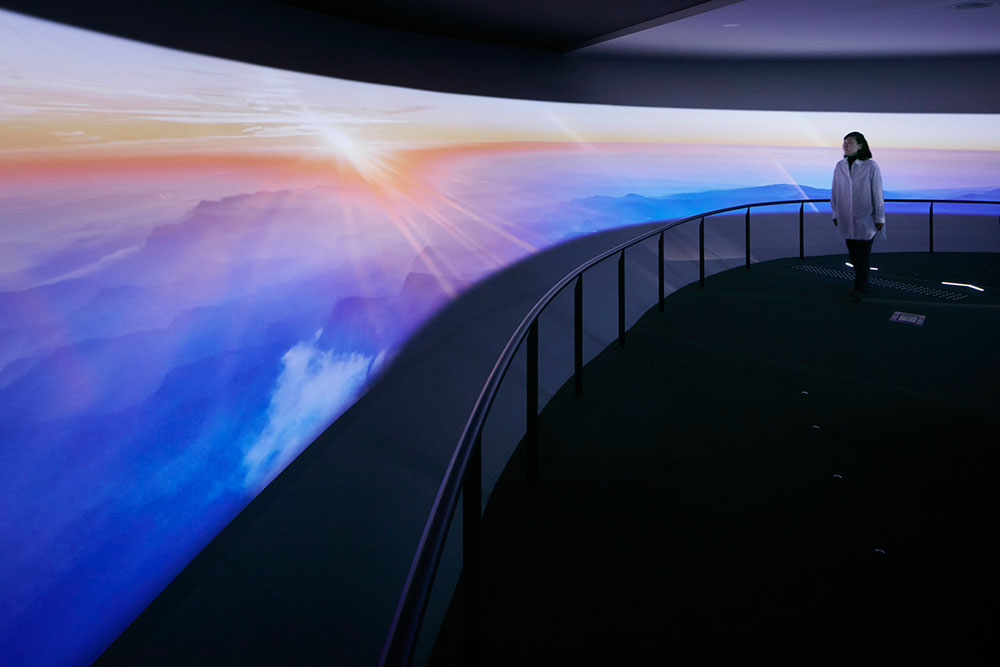
Mt. Fuji World Heritage Centre, Shizuoka
Implementing Video composition using only images without narration or subtitles
Learn more
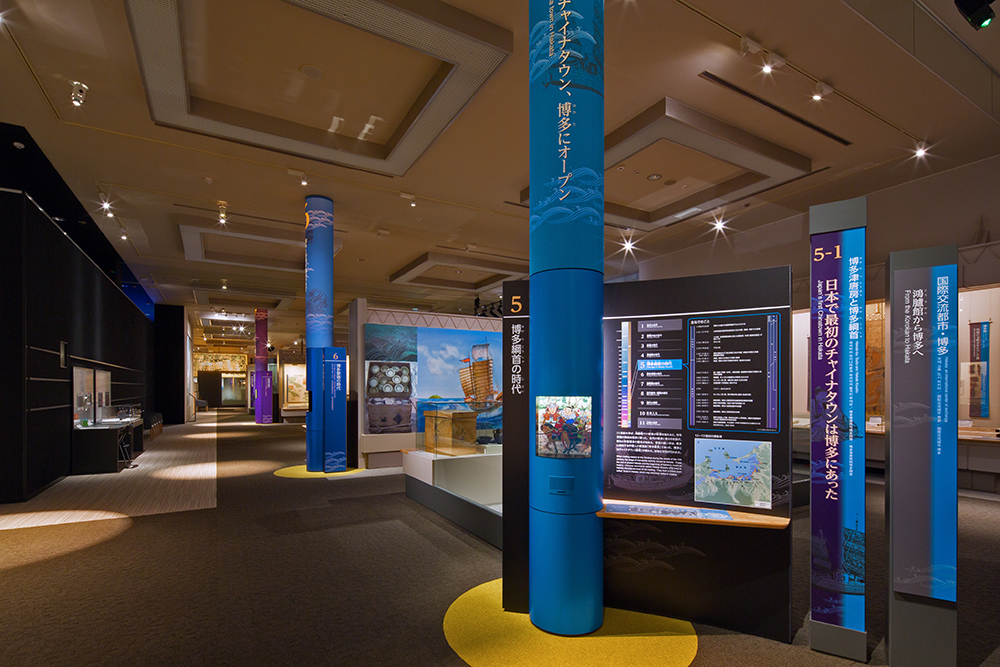
Fukuoka City Museum
A universal museum that is easy for everyone to use and understand
Learn more
Related information | Announcements
Photography: Nacása & Partners Inc., Forward Stroke inc., ss kikaku, Kawakami Photo Studio, Daichi Misono, and others
Initiatives to create a safe and secure space
In order to realize spaces that are comfortable, easy to use, safe, and secure for everyone, the entire company is working together to create better spaces in accordance with the "Tanseisha Group Health and Safety Policy" and the "Tanseisha Group Quality Policy."We also continue to make efforts to improve quality technology, such as holding construction technology review meetings.
・ Tanseisha Group Safety and Health Policy
・ Tanseisha Group Quality Policy
Employee training to improve technical expertise
Education for Production Professionals
With the aim of improving the quality and technology of production workers, we conduct "production professional skills training" related to "laws and regulations", "safety", and "construction". In addition to creating and disseminating our own "Laws and Regulations Handbook" that summarizes laws and regulations related to space creation, we also hold seminars on process management and sharing technical knowledge based on case studies. In addition, we respond to customer needs by reminding them of safety and quality control at the planning stage and on-site.
Education for designers and planners
We reaffirm the points of "design basics," "laws and regulations," and "equipment" that designers and planners need to know when promoting their work, and provide technical learning opportunities to avoid problems and risks from the design stage. In addition, we hold technical seminars for designers to strengthen their engineering skills and develop design tools such as video content.
Education for young employees
As part of our training for new employees, we implement technical education programs on laws and regulations, prohibited matters, special management matters, electrical and mechanical equipment, etc. In practice, we are also working to improve technical skills, such as providing opportunities for construction consultations and on-site guidance on projects for young employees.
For young employees up to their third year as designers and planners, we have developed a training program based on the three axes of "creative," "engineering," and "career," and we provide seminars, field trip training, and interviews as comprehensive basic education that cannot be supplemented by on-the-job training.
Initiatives to improve the safety and quality of spaces
Implementation of "Construction Technology Review Meeting"
Before construction begins, we check the construction plan and safety plan, consider key management items and measures for prohibited items and special management items in terms of safety and quality, and hold "construction technology review meetings" with the aim of eliminating complaints, troubles, disasters and accidents and ensuring smooth construction. We strive to ensure quality by pointing out and extracting issues and problems in space creation, and by confirming laws and regulations, verifying structures and confirming construction methods.
Sharing information on safety and quality
At the monthly "Safety and Health Committee," we analyze and share claims and maintenance reports, and strive to prevent recurrence, as well as consolidate information on quality and technology improvement, and provide coordination, instructions, and guidance to the relevant departments. In addition, we have created a site on the company intranet dedicated to safety and quality that consolidates technical knowledge and information, and share information widely, and we also regularly review the "Safety Handbook."
Providing educational opportunities
Every year, we provide seven items of education in qualification education: special education such as scaffolding assembly, special training in low-voltage electrical handling, scaffolding inspection practitioner training, foreman and safety officer training, general safety and health officer training, foreman and safety officer ability improvement education, and full harness type fall prevention equipment special education. In addition to production employees, we have established a system that allows technical partners and partner companies to take the course, and provides a wide range of educational opportunities to improve safety and quality.
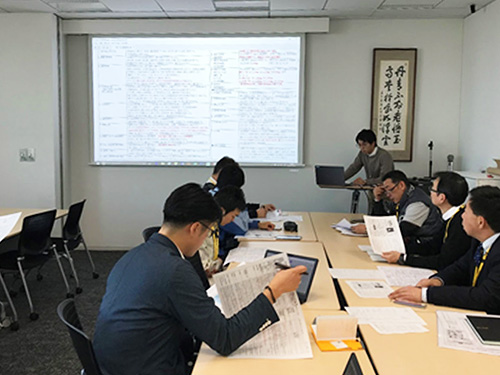
Promoting Well-Being Management
Tanseisha Group Well-Being Management Policy
The Tanseisha Group believes that the diverse personalities and creativity of its employees are its most important management resource.
We believe that the physical and mental health of each employee is the foundation for the expression of creativity and healthy growth.
Therefore, we respect the lifestyles and values of our employees,
We support diverse working styles by establishing a workplace environment and systems that consider health and safety.
We will promote initiatives that will lead to employees feeling job satisfaction and enjoyment in their work.
The well-being of employees and their families (physical, mental and social satisfaction,
We aim to improve this balance (a good, balanced state) and manage our business in a way that contributes to a rich and colorful life.
About the "TANSEISHA WELL-BEING" logo
The "TANSEISHA WELL-BEING" logo, which visually expresses Tanseisha's unique concept of well-being, is used to foster employee awareness and support the promotion of well-being management.
The logo is designed to evoke the image of overlapping circles representing the three elements necessary for well-being - physical, mental, and social - influencing and balancing each other, and is complemented by the VI color of the Tanseisha Group's purpose: "Drawing the future from space, bringing color to people and society."
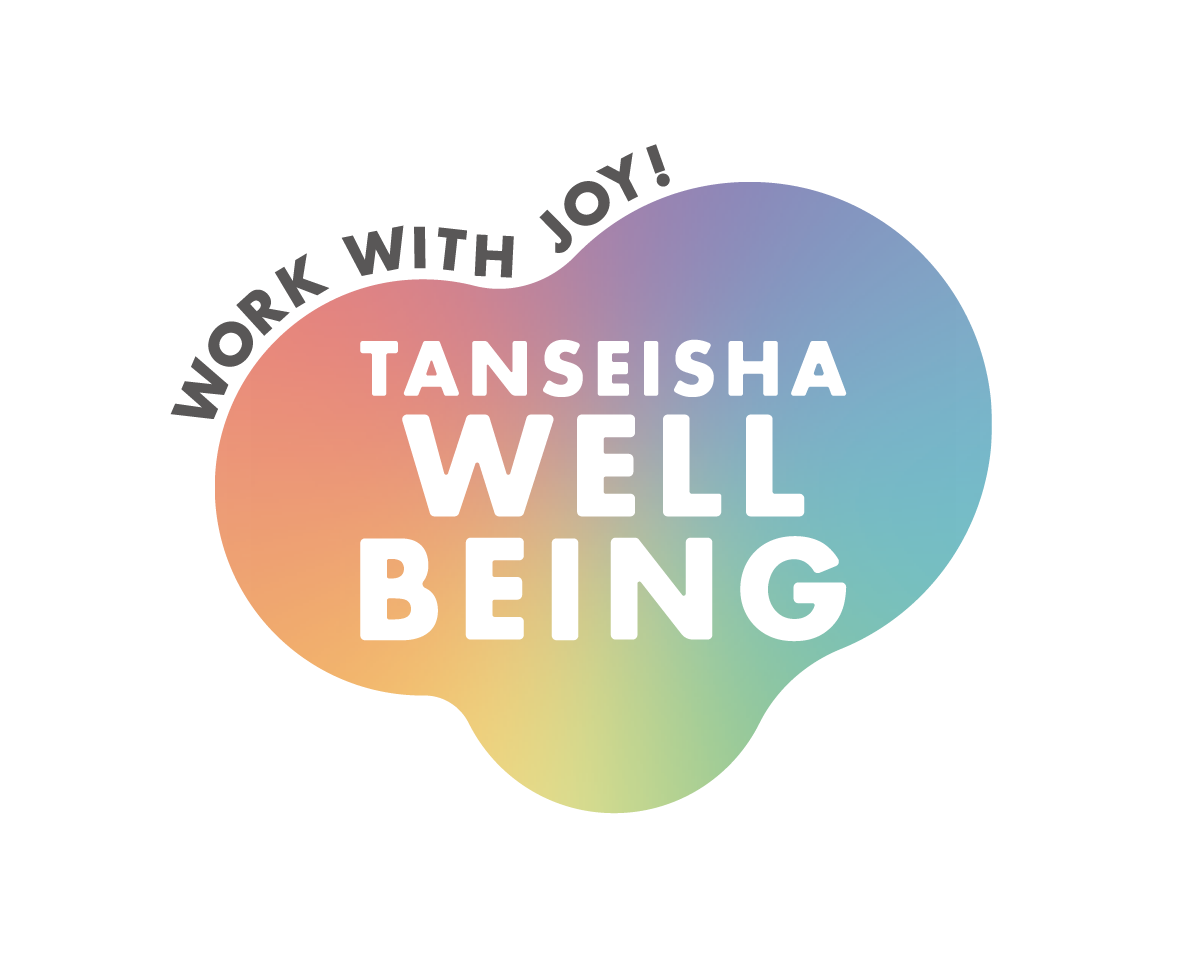
Promoting work-life balance
In addition to the "telework system" and "flextime system" that allows employees to freely decide their working hours for all employees, we have introduced a short-time work system that is not based on childcare or nursing care reasons, and aim to improve productivity and well-being by promoting work-life balance. In addition, we are taking measures such as introducing sick leave and infertility treatment leave so that capable and motivated employees can balance their work with their family and private lives and choose various working styles, creating a workplace where diverse human resources can work comfortably and demonstrate their abilities, and promoting work style reform.
Childcare and nursing care support
We are working on improving our system to increase the rate of employees taking childcare leave, shortening working hours for employees who are raising children, encouraging employees to take annual paid leave, and partnering with company-run daycare centers. We have also established a "Family Friendly Promotion Committee" with the aim of supporting the development of the next generation, and are working to promote activities that allow for diverse work styles through support such as setting up a consultation desk for childcare and elderly care and holding elderly care seminars. In 2007, we obtained the next-generation certification mark (nicknamed "Kurumin").
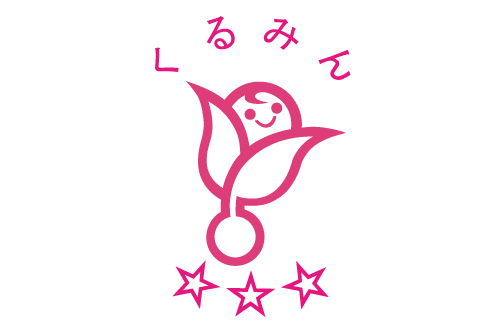
General employer action plan based on the Act on Advancement of Measures to Support the Development of the Next Generation
We will formulate the following action plan to create a workplace where both men and women can work long term and an environment where women can play active roles in management positions.
- Planning period (8th period)
April 1, 2024 - March 31, 2027 - Goals and measures
<Goal>
Increase the rate of male employees taking childcare leave to an average of 40% or more during the planned period.
<Measures>
・Regularly disseminate information about paternity leave (from April 2024)
・Interviews will be held for both male and female employees who wish to take childcare leave (from April 2024)
・Interview male employees who have taken childcare leave and disseminate information to employees (from August 2024)
・Seminars will be held for employees returning to work after childcare leave (from March 2025)
Promoting work style reform
We have set a goal of reducing long working hours and are working across the company to achieve it. We have also established a Work Style Reform Promotion Committee to review work styles and the office environment.
Development of IT environment
In order to streamline operations and improve productivity, we are providing employees with work devices that match their working styles, as well as improving our IT environment by introducing RPA (Robotic Process Automation) and AI chatbots, and digitizing and going paperless for purchasing transactions and internal application documents and procedures.
Streamlining business processes
With the aim of streamlining our internal business processes, we are also working to utilize unique digital tools tailored to each job type and task, such as expanding our dedicated information database for production positions and introducing a document creation navigation system.
Improving the working environment
We are promoting the creation of offices that consider productivity improvement and well-being in line with new work styles, and we are promoting the liberalization of clothing by adopting a dress code-free system, and in the office update at the head office, we have introduced refreshment and communication, massage spaces and play zones (table tennis tables and putter mats), café zones and biophilias, etc. We have increased the number of facilities that can make you mentally and physically healthy. In addition to introducing a free address system at the head office and branches, we are promoting the improvement of the office environment by setting up a web booth that can be used as a simple changing room as part of privacy considerations. In addition, we have set up a "distributed networked office" to increase the number of points of contact between employees without dispersing people. From the perspective of improving productivity and risk management, we offer options for working places other than the head office, branch offices, sales offices, and home, such as the use of external shared offices and the establishment of satellite offices.
Members of the base are engaged in voluntary office management activities, and when renovating the Kansai Branch (Osaka), employees who actually work in the office participated in the renovation project.
Conducting in-house awareness-raising activities
Through "Work Style Reform NOW," a regular message from the president sent out within the company, we inform employees of the importance of health, as well as the importance of correcting long working hours and being conscious of how we use our time, which are the foundation of health.
Related information | Announcements
Health management and employee benefits initiatives
We have established the Health Management Division as a department dedicated to health promotion, and we provide education and response to incidents to raise awareness, as well as develop company-wide measures by sharing current data and information. By early detection of mental and physical disorders that can occur to anyone and careful follow-up according to the situation, we contribute to the maintenance of social health throughout the organization.
We conduct regular health checkups and stress checks in accordance with the Occupational Safety and Health Act. The results of the stress check are analyzed by a group and used for organizational development and management. In addition, we provide medical checkups, women's health checkups to prevent women's specific diseases, influenza vaccinations, industrial physician interviews, and online counseling.
In addition to "self-care training" for all employees to learn skills to recognize and appropriately deal with their own stress and physical and mental problems, and "line care training" to help managers quickly notice and learn how to respond to mental health problems of their subordinates, we are also working to raise employee awareness by visualizing the status of leave taken in real time.
By protecting the lives of employees and their families from unforeseen work disabilities, we have introduced group long-term disability income compensation insurance (GLTD) and group medical insurance to support early return to work by concentrating on recuperation with peace of mind and helping them return to work early.
Wage system
Wages are determined by linking three systems: a "grading system" based on the standard of expected roles, an "evaluation system" based on actions and results, and a "compensation system" based on company performance, discussions with employee unions, and regulations. In addition to the monthly salary, wages under the compensation system are paid to employees as "bonuses" twice a year in principle.
In addition to ensuring wage levels above the statutory minimum wage, we are working to establish a system to eliminate unreasonable disparities in treatment based on gender and employment status in accordance with the provisions of the Part-time and Fixed-Term Employment Labor Act, the Worker Dispatch Act, etc.
Wage increases are implemented based on responses to price increases and consultations with employee unions.
Initiatives to improve employee engagement
Tanseisha has been conducting employee opinion surveys every two years since 2016. We consider this survey important in order to continue being a "good company" that balances "employee happiness at work" with "high performance" and to become an even better company. Based on the survey results, we link them to environmental improvement activities for the whole company and each department. In addition, with the aim of strengthening communication between employees and improving engagement, we also promote communication with employees' families by publishing the in-house newsletter "TANSEI-zine" and holding family days where employees' families can tour the office.
In order to improve engagement across the entire group, we hold a walking event called "Tansei Telewalk" using a pedometer app, hold joint induction ceremonies and training for new recruits, and proactively disseminate information within the company and to group companies. Furthermore, we hold an annual awards ceremony to recognize the work performance and results of employees, including those in group companies, and outstanding design activities.
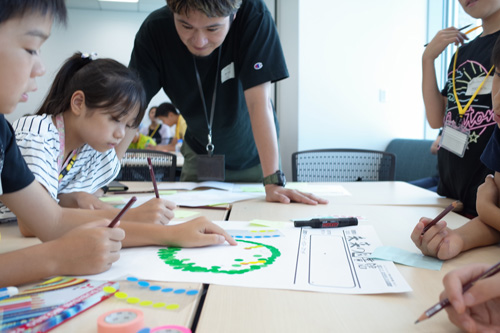
Recruiting and training personnel
Personnel Policy
We recognize that the diverse personalities and creativity of our employees are our most important management resources, and we respect their autonomy and individuality. Based on the recognition that employee health is the foundation for the expression of creativity and healthy growth, we will create a comfortable working environment that considers the health and safety of our employees. In order for our company to continue to be a professional and challenging group, we will provide opportunities for growth and support the growth of the team and the organization as a whole, aiming for each employee who is a member of the group to become a strong individual.
- We respect the basic human rights and individuality of our employees.
We do not discriminate on the basis of race, religion, nationality, sex, sexual orientation, gender identity, or disability, and we respect diverse individuality and values. - We will create a comfortable and rewarding working environment.
We will consider the health and safety of our employees and create a workplace environment where they can do rewarding work and where diverse working styles are possible. - We support the growth of employees, teams, and organizations.
We provide opportunities for growth through diverse work challenges, human resource development (education and training/career development), and organizational development.
Desired talent profile (= strong individual)
- We are looking for people who strongly identify with our values and can take action.
- We recognize that employee health is the foundation for creativity and healthy growth, and we seek employees who value not only their own health, but also the health of their team and organization.
[Values/Our values]
Facing People
We sincerely address the thoughts of our colleagues and stakeholders who are connected through the space.
Putting our hearts and souls into our work
We approach each and every job with sincerity and professional pride.
Challenging beyond the present
We continue to take on new challenges while growing and transforming ourselves through flexible thinking and creativity.
Combining colorful personalities
We recognize each other's sparkling creativity, cutting-edge technology, and individuality, and come together as one.
Enjoying our work
Enjoy all the work and changes.
Recruitment Policy
We respect the basic human rights of applicants and conduct fair recruitment selection based on the aptitude and ability of the applicant. Furthermore, through this recruitment selection process, we hire people who strongly empathize with our purpose and values, who are dedicated to achieving them, and who strive to become and continue to be the type of people we desire.
- [Keyword]
- ・ Passion (passion, perseverance) = red
- ・Wisdom (expertise, knowledge and skills) = Blue
- ・Creativity = Tansei
- ・Teamwork = Sha
Human Resources Development Policy
Based on the idea that work develops people, we respect and support the desire of our employees to learn and grow. We base our human resource development on diverse work experiences and OJT, and support growth through visualization of skills and experience, placement and rotation, and OFF-JT education and training. We also support employees' autonomous career development.
- ・Providing education and training to acquire basic and specialized knowledge and skills
- Hierarchical education, job-specific education, technical education, OJT (on-the-job training)
- ・Providing diverse and challenging work opportunities
- Providing opportunities for diverse and challenging work experience through project assignments, placements and transfers
- ・Providing opportunities for autonomous career development
- Career interviews, career development training, career consulting, self-development (support for obtaining qualifications)
- ・Providing job satisfaction and growth opportunities in a new relationship between the individual and the company
- Developing a personnel system that supports diverse work style options
Recruitment activities
As part of our recruitment activities, we hold seminars and workshops to introduce our company to potential hires (new graduates and job seekers who have graduated within 5 years) to deepen their understanding of the industry and our company.
In order to ensure non-discriminatory employment and recruitment based on the Personnel Policy, we instruct interviewers not to discriminate based on race, religion, nationality, place of origin, gender, school name, etc., based on the Ministry of Health, Labour and Welfare's "Basics of Fair Recruitment Selection," and clearly and formally communicate the recruitment process to all candidates through the recruitment website.
When hiring, we comply with the laws and regulations of each country regarding human rights and labor, and strive to prevent child labor and forced labor. In order to prevent child labor, the age of applicants is confirmed by official documents when hiring. In addition, in order to prevent forced labor, we present conditions such as working hours and wages based on the applicant's intention to apply, and then obtain the consent of the applicant.
In addition, in order to maintain the possibility that former employees who have retired will be active at the company again by utilizing the experience and abilities they have cultivated so far, we will check the contact information if there is a desire or desire to communicate recruitment activities after retirement, and we will also recruit at Amrunai.
Career development support
We plan and implement educational and training programs both inside and outside the company so that new employees, as well as young employees, mid-career employees, and managers, can acquire the skills required for each level and job type as "spatial creation professionals." We also support the career development of our employees by holding career interviews to encourage their growth as managers and professionals.
We also provide evaluator training for managers with the aim of understanding the capabilities of individual creators and providing appropriate career support.
Support for obtaining qualifications
We support each employee's independent learning and aim to develop highly specialized human resources. As part of this, we have established a qualification support system for first-class architects, first-class construction management engineers, and other qualifications that are legally required or deemed necessary for the job, and we support employees in obtaining qualifications by paying a portion of the expenses associated with obtaining them.
Eligible support recipients (as of 2024)
1st class architect, 2nd class architect, 1st class structural design architect, 1st class Equipment Layout architect, building facility engineer, 1st class construction management engineer, 1st class construction management engineer assistant, 2nd class Building Work management engineer, 2nd class Building Work management engineer assistant, supervising engineer, real estate agent, curator, 1st and 2nd class event management specialist, small and medium-sized enterprise consultant, managing architect, outdoor advertising specialist, construction accountant, electrical and electronics general technical supervision, specially managed industrial waste management manager, safety manager, 1st class sanitation manager, fire prevention manager, safe driving manager, manager to prevent unreasonable demands, waste management manager, etc.
Initiatives to improve creativity
To strengthen our creative capabilities, we disseminate and share information for various research purposes, such as design knowledge, know-how, and materials, at our head office and online, and hold seminars and training sessions with top creators from outside the company.
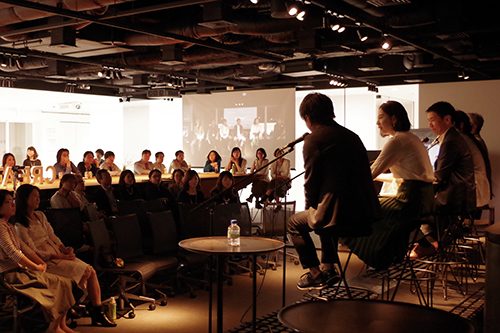
Related information | Media coverage
New employee training "Human Resource Development Project"
Since 2005, we have been implementing our original practical new employee training program, "Hitozukuri Project. This training program consists of "introductory training" and "work guidance" to learn about the company and the basic knowledge necessary for business promotion, and "product creation" to practice manufacturing.
In the "Product Creation," which is the core program of this training, new employees work as a team and experience various difficulties through actual product creation. The objective is to gain basic knowledge appropriate to the characteristics of the work and prepare for practical work after assignment. In the exhibitions held since 2011, we have held a variety of events with front-line designers and first-class craftsmen. The exhibitions held since 2011 showcase the learning and growth of new employees through products created with leading designers and first-rate craftsmen, and convey our attitude and commitment to human resource development. (Photo by Yosuke Owashi and others)
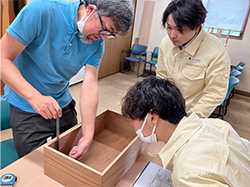
Designers participating in the Human Resource Development Project
Aoki Ryosaku and Haruta Masayuki (TENT), Ashizawa Keiji (Ashizawa Keiji Architectural Design), Ito Kenji, Ito Yu and KemmotsuYoshimi (SOL style), Ono Naoki and Yamamoto Yuki (YOY), Kakuda Yota (YOTA KAKUDA DESIGN), Kajimoto Hiroshi (Kazimoto Design Office), Kano Yuma (NOU Inc.), Kudo Kentaro (STUDIO noem), Kobayashi Mikiya (MIKIYA KOBAYASHI INC.), Yamamichi Takuto, Chiba Motoo, Nishikawa Himari and Hayama Shogo (Tsubame Architects Inc.) + Sato Nanami (Doken Inc.), Suzuno Koichi (TORAFU Architects), Tsunoda Mayuko and Hasegawa Satoshi (minna), Terada Naoki (Interoffice), Nagaoka Tsutomu (POINT), Nakabayashi Tetsutaro (Tokyo Zokei University), Narukawa Hajime (AuthaGraph), Jun Hashimoto (Funio Design), Kunikazu Hamanishi (STUDIO COHAKU), Yusuke Hayashi and Yoko Anzai (DRILL DESIGN), Yasuji Fujimori (Fujimori Yasuji Atelier), Akira Mabuchi (AKIRA MABUCHI DESIGN), Hidefumi Yamaguchi and Yuko Oriyama (Caro Inc.), Makoto Yamaguchi (Makoto Yamaguchi Design), Keiichiro Yamada (KAICHI DESIGN), Sachiko Yuzawa (ASSOCCA STYLE), Ryota Amano, Makoto Inagaki, Yukiko Kachi, Tsuyoshi Kato, Taisuke Kamigauchi, Takeshi Kanda, Atsushi Suzuki, Yoshifumi Takeda, Kentaro Nagahara, and Atsuki Miyamoto (Tanseisha)
Flyer for the Human Resource Development Project Exhibition (Click on the image to open the PDF)
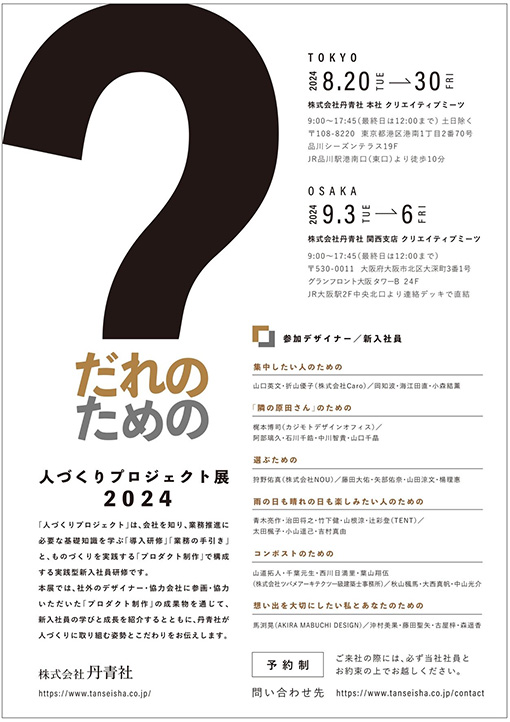
人づくりプロジェクト展2024PDF
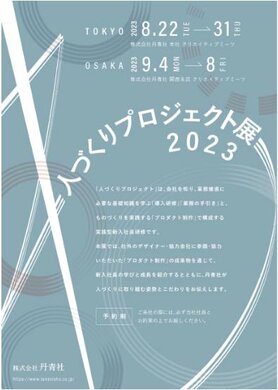
人づくりプロジェクト展2023PDF
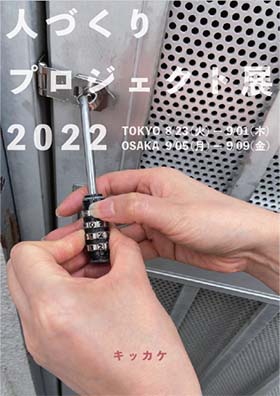
人づくりプロジェクト展2022PDF
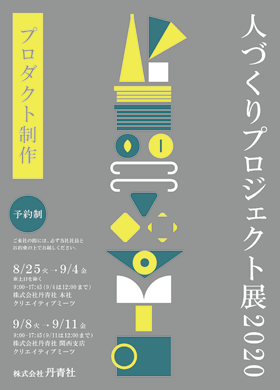
人づくりプロジェクト展2020PDF
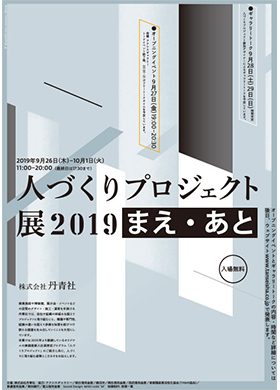
人づくりプロジェクト展2019PDF
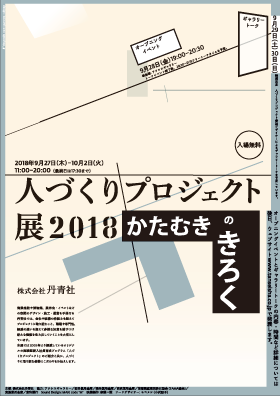
人づくりプロジェクト展2018PDF
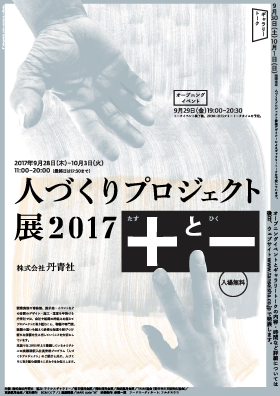
人づくりプロジェクト展2017PDF
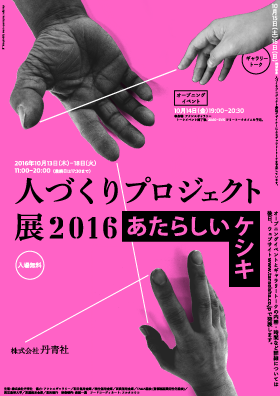
人づくりプロジェクト展2016PDF
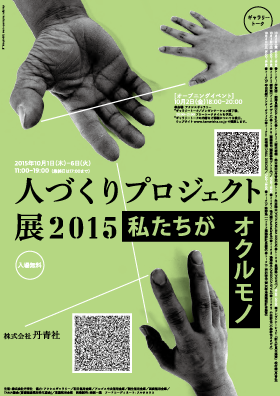
人づくりプロジェクト展2015PDF
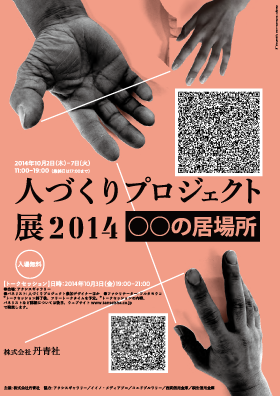
人づくりプロジェクト展2014PDF
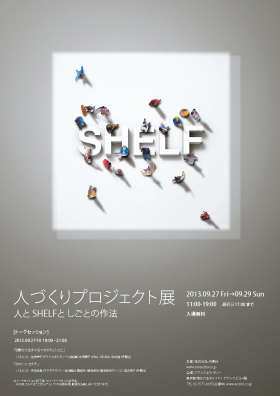
人づくりプロジェクト展2013PDF
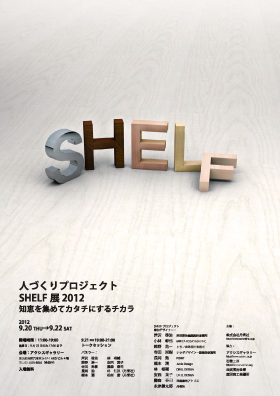
人づくりプロジェクト展2012PDF
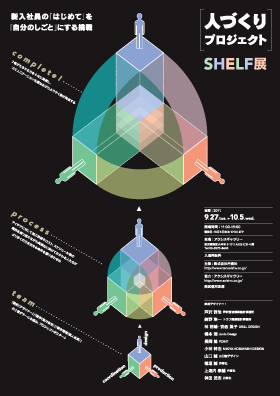
人づくりプロジェクト展2011PDF
Related information | Social recognition and awards
Cultivating a culture of DE&I (Diversity, Equity & Inclusion)
Diversity training
Given that we employ people who are considered to be social minorities, such as people with disabilities and people of different nationalities, we have been conducting training for all executives and employees since 2017, and training for managers who play an important role in human resource development and management since 2021, in order to learn about and deepen understanding of diversity.
By learning and gaining insights about work and working styles from people with diverse characteristics (people with physical disabilities, registered foreigners, LGBTQ+, etc.), we are helping to foster a corporate culture that responds to diversity and accepts diverse working styles.
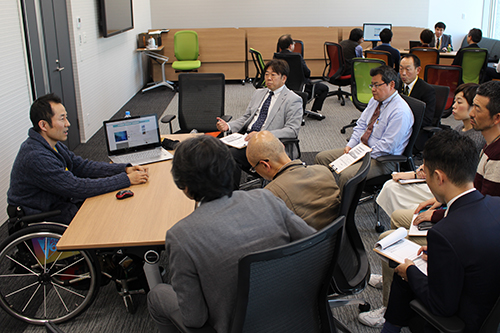
Related information | Announcements
Promoting women's participation in the workplace
In order to improve the employment environment so that women can play an active role, we have formulated and are implementing an action plan based on the Act on Promotion of Women's Participation and Advancement in the Workplace. We have set targets for the ratio of women in management positions, and are implementing career training programs, as well as promoting the acquisition of childcare leave, including for men.
In 2023, we received two stars (level 2) of the "Elboshi Certification" as a company with an excellent record of implementing initiatives to promote women's participation in the workforce.
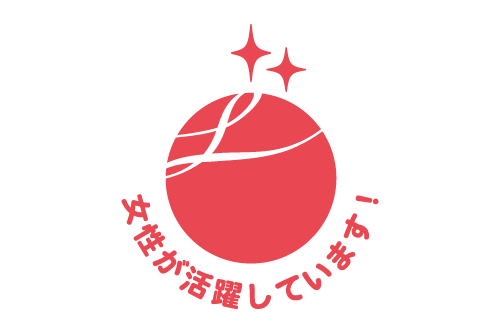
General employer action plan based on the Act on Promotion of Women's Participation and Advancement in the Workplace
We will formulate the following action plan to create a workplace where both men and women can work long term and an environment where women can play active roles in management positions.
- Planning period (5th period)
April 1, 2024 - March 31, 2027 - Goals, initiatives, and implementation period
- Numerical targets for "Providing opportunities for professional life"
<Goal>
Increase the percentage of female workers in managerial positions (section manager level and above) to 15% or more.
<Details of the initiative and implementation period>
・Conduct interviews (surveys) with female managers and introduce them to employees (from June 2024)
・We will encourage managers to support and shape the career paths of role model employees. We will communicate the results to employees (from September 2024)
・Implement training and seminars for employees who are interested in becoming managers (from January 2025)
・Hold interviews regarding future career plans for female employees who are candidates for managerial positions and their superiors (from July 2025) - Numerical targets for "balancing work and family life"
<Goal>
Increase the rate of male employees taking childcare leave to an average of 40% or more during the planned period.
<Details of the initiative and implementation period>
・Regularly disseminate information about paternity leave (from April 2024)
・Interviews will be held for both male and female employees who wish to take childcare leave (from April 2024)
・Interview male employees who have taken childcare leave and disseminate information to employees (from August 2024)
・Seminars will be held for employees returning to work after childcare leave (from March 2025)
- Numerical targets for "Providing opportunities for professional life"
Promoting the active participation of employees with disabilities
When hiring people with disabilities, we assign them to work positions that take into consideration the characteristics of their disabilities, and we also provide interviews and consultations with disability vocational counselors as needed to help them settle into the workplace.
Furthermore, to create a workplace environment that is comfortable for hearing-impaired employees, we have introduced the communication support and conversation visualization app "UD Talk®" (corporate plan) and are utilizing the dispatch of sign language interpreters, etc. We are also working to foster an inclusive organizational culture by sharing and providing consultation on methods and procedures for ensuring information access on our internal portal site, and holding internal social events using sign language to facilitate smoother work-related communication between hearing-impaired employees and other departments.
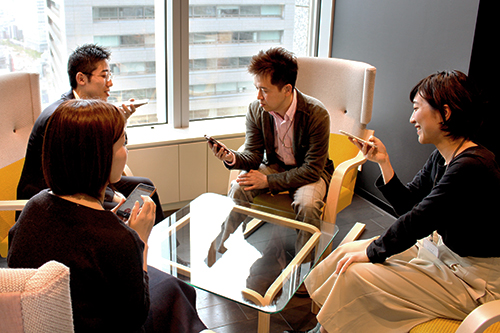
Initiatives to promote the active participation of seniors
In order to promote the active participation of senior personnel, we are rehiring indefinite-term employees who wish to continue working after retirement age in order to expand employment opportunities. The assignment and duties of rehired employees are determined taking into consideration the employee's affiliation at the time of retirement age, work experience, qualifications held, health condition, personal preferences and aptitude. We also provide benefits that make use of their expertise, career interviews and career training for senior personnel, and systems that allow for the selection of diverse work styles.
Healthy labor-management relations
The Company has established one of the Group Code of Conduct as "Respecting freedom of association and basic labor rights, including workers' right to organize and the right to bargain collectively," and conducts management that respects human rights. The company adopts the union shop system, and 100% of the employees subject to the collective agreement are members of the employee union.
Once a month, we hold a Management Council with the employee union to explain to the employee union management policies, management plans, and overall company-wide performance, as well as discuss working conditions such as working hours, holidays, vacations, and working conditions, standards for wages and bonuses, improvement of health and safety, management of welfare programs, education, training, and career development, etc., and strive for mutual understanding, communication, and coordination of opinions between labor and management. In addition, apart from the Management Council, the Committee for Improving Working Hours, etc., is held every month with the participation of management and employee representatives to discuss ways to ensure good working conditions.
External Initiatives
Participating in the "Art and Sign Language Project"
Since 2011, we have been participating in the "Art and Sign Language Project," which aims to create an environment where people from all walks of life can enjoy and appreciate art in a rich and enjoyable way by loosely linking art, museums, sign language, and the deaf and hard-of-hearing with the keywords "art," "museums," and "people who are deaf or hard-of-hearing. Since 2021, a company employee has served as a representative of the project, planning and implementing art appreciation tours and workshops with museums and organizations nationwide.
"Art and Sign Language Project" website
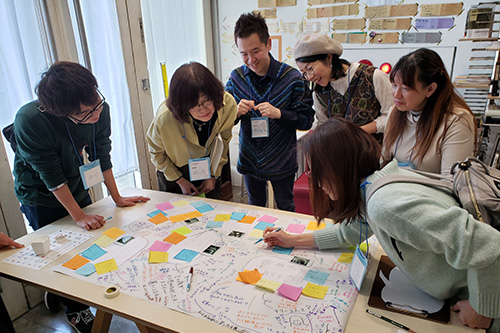
Venue: Contemporary Art Gallery, Art Tower Mito
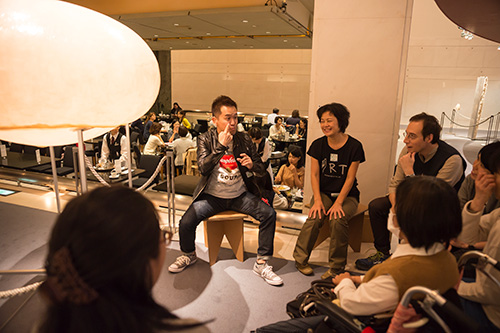
Venue: Museum of Together Exhibition (organized by Nippon Foundation) / Photo courtesy of NPO Able Art Japan / Photography by Haruko Miura
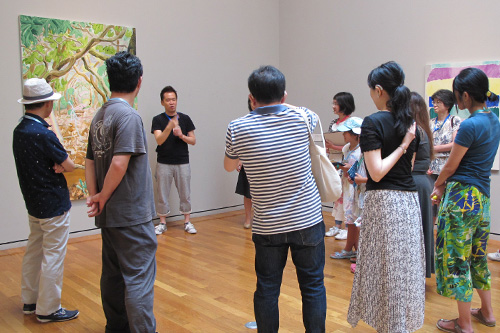
Venue and photos provided by Chigasaki City Museum of Art
Cooperation and co-hosting of "Super Welfare School @ SHIBUYA"
Aiming to make "super welfare" a part of everyday life in the city of Shibuya, we have been cooperating since 2021 with the "Super Welfare School @ SHIBUYA" event, which disseminates specific actions and the latest examples related to education, lifelong learning, learning, working, etc. from all over the country, both offline and online from Shibuya. In 2024, we participated in a wide range of activities, including co-hosting events, cooperating in exhibits and experience content, and having employees speak at symposiums. (Total number of participants in 2024: 5,910)
"Super Welfare School @ SHIBUYA" is being held as part of the "After Super Welfare Exhibition" project of the "Super Welfare Exhibition (official name: 2020, Shibuya. Let's Experience the Daily Life of Super Welfare)," which has been held for one week in November every year since 2014, mainly at Shibuya Hikarie, in an effort to remove "mental barriers" against minorities such as people with disabilities and welfare itself. Our company has been cooperating with the Super Welfare Exhibition since 2014, and for five years from 2017 to 2021, we co-hosted it with the NPO People Design Institute.
"Super Welfare School" (Organizer: NPO People Design Institute) Website
Participating in and supporting "Universal Camp in Hachijojima"
We have participated in and cooperated with the "Universal Camp in Hachijojima" organized by the NPO Universal Event Association since its inception in 2005. Based on the ideas of normalization and diversity, this event is an exchange event aimed at realizing "a society where everyone can live vibrantly together," and it brings together a wide variety of participants, regardless of age, disability, or nationality.
"Universal Camp in Hachijojima" (NPO Universal Event Association)
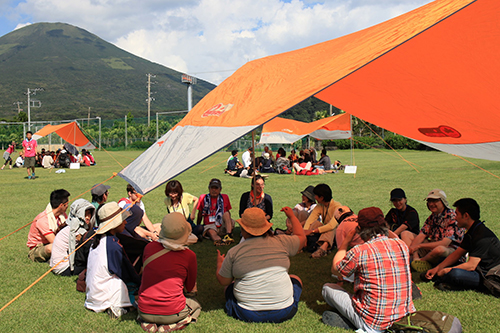
Diversity Programs
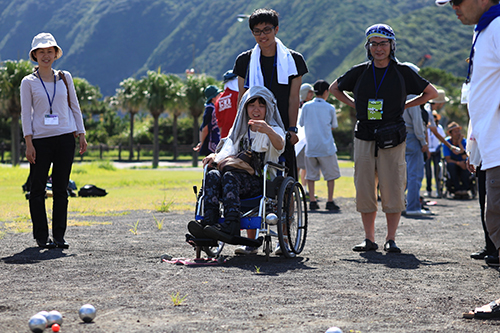
Universal sports experience
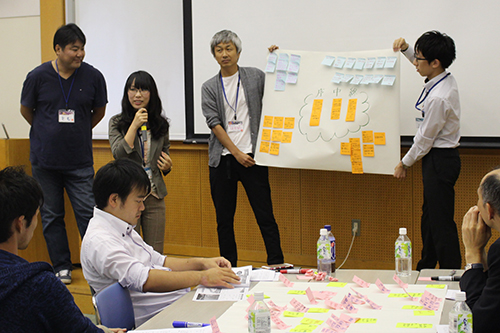
Post-camp training (reflection on the camp training)
Social recognition and awards
"2nd JACE Event Awards" (Japan Event Industry Promotion Association)
"6th Corporate Philanthropy Award" (Japan Philanthropy Association)
Past Initiatives
Participation in "Universal Camp TOKYO" (2017-2021)
Since 2017, we have participated in the "Universal Camp Tokyo" event held at Shinagawa Season Terrace (MINATO CITY), where our head office is located, as one of the companies that make up the executive committee. This event was held in collaboration with the local government and companies based in the Shibaura Konan area, and as part of social contribution activities in the area, we provided an opportunity for diverse people to gather, interact, and understand each other in the city center under the theme of "Realizing an understanding of diversity and a symbiotic society in the community."
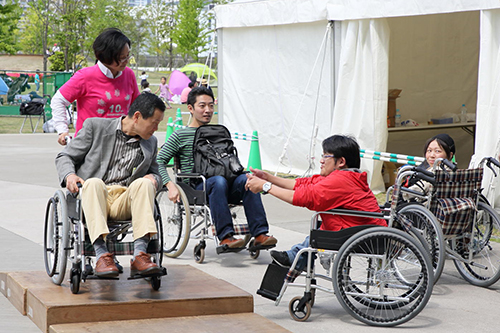
Exchange program with special lecturers
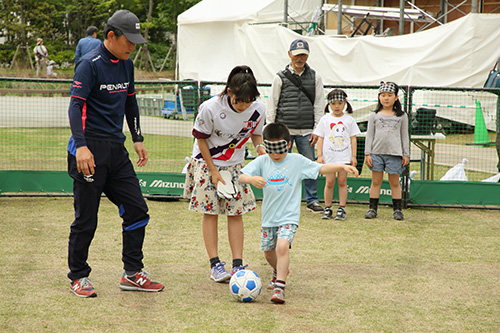
Parasports experience
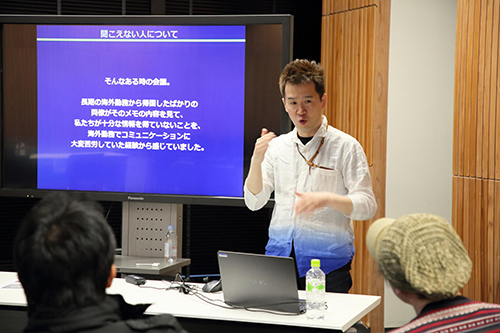
Diversity Seminar
For each category, the following tags are used to indicate the correspondence with the core subjects of ISO 26000.
| Corporate governance. | Corporate governance. |
|---|---|
| Human Rights | Due diligence | Human rights risk situations | Avoidance of complicity | Resolving grievances | Discrimination and vulnerable groups | Civil and political rights | Economic, social and cultural rights | Fundamental principles and rights at work |
| Labor Practices | Employment and employment relationships | Conditions of work and social protection | Social dialogue | Health and Safety at work | Human development and training in the workplace |
| Environment | Prevention of pollution | Sustainable resource use | Climate change mitigation and adaptation | Protection of the environment, biodiversity and restoration of natural habitats |
| Fair Operating Practices | Anti-corruption | Responsible political involvement | Fair competition | Promoting social responsibility in the value chain | Respect for property rights |
| Consumer Issues | Fair marketing, factual and unbiased information and fair contractual practices | Protecting consumers’ health and safety | Sustainable consumption | Consumer service, support, and complaint and dispute resolution | Consumer data protection and privacy | Access to essential services | Education and awareness |
| Community (Community Involvement and Development) |
Community involvement | Education and culture | Employment creation and skills development | Technology development and access | Wealth and income creation | Health | Social investment |
Tanseisha Personnel Data
・Scope of calculation: TANSEISHA Co., Ltd.)
・Collection period for each fiscal year: February 1st of the current year to January 31st of the following year (excluding those with notes)
Diversity
| Fiscal Year 2021 | Fiscal Year 2022 | Fiscal Year 2023 | FY2024 | ||
|---|---|---|---|---|---|
| Number of employees | People | 1,040 | 1,045 | 1,071 | 1,113 |
| -Male | People | 781 | 782 | 794 | 803 |
| -Female | People | 259 | 263 | 277 | 310 |
| -Female ratio | % | 24.9 | 25.2 | 25.9 | 27.9 |
| Number of managers (section managers and above) | People | 299 | 325 | 307 | 309 |
| -Male | People | 270 | 294 | 278 | 280 |
| -Female | People | 29 | 31 | 29 | 29 |
| -Ratio of female managers | % | 9.7 | 9.5 | 9.4 | 9.4 |
| Employment rate of people with disabilities (*) | % | 2.21 | 2.18 | 1.95 | 2.30 |
| Number of new graduates hired (potential hires) | People | 24 | 17 | 25 | 21 |
| -Male | People | 14 | 9 | 14 | 8 |
| -Female | People | 10 | 8 | 11 | 13 |
| -Female ratio | % | 41.7 | 47.1 | 44.0 | 61.9 |
| Number of experienced employees hired (career hires) | People | 19 | 23 | 42 | 47 |
| -Male | People | 12 | 14 | 25 | 30 |
| -Female | People | 10 | 8 | 11 | 13 |
| -Female ratio | % | 36.8 | 39.1 | 40.5 | 36.1 |
| Experienced hiring ratio | % | 44.2 | 57.5 | 62.7 | 69.1 |
| Average length of employment | Year | 15.8 | 16.2 | 16.1 | 15.7 |
| -Male | Year | 18.1 | 18.4 | 18.3 | 18.1 |
| -Female | Year | 9.0 | 9.6 | 9.6 | 9.7 |
| Turnover rate | % | 3.0 | 3.1 | 3.7 | 3.4 |
| Average age | Age | 43.1 | 43.5 | 43.5 | 43.3 |
| -Male | Age | 45.3 | 45.8 | 45.7 | 45.6 |
| -Female | Age | 36.3 | 37/0 | 37.2 | 37.5 |
| Average annual salary | Yen | 7,579,741 | 8,028,112 | 8,107,647 | 8,475,950 |
| Gender wage gap All employees |
% | - | - | 73.9 | 75.7 |
| - Regular employees | % | - | - | 75.0 | 77.1 |
| - Part-time/fixed-term workers | % | - | - | 60.0 | 63.0 |
*As of June 1st of each year (Report on the Employment Status of People with Disabilities)
Occupational Safety and Health
| Fiscal Year 2021 | Fiscal Year 2022 | Fiscal Year 2023 | FY2024 | ||
|---|---|---|---|---|---|
| Total working hours | Hour | 2,084 | 2,100 | 2,178 | 2,156 |
| Average overtime hours | Hour | 16.7 | 18.7 | 23.2 | 22.1 |
| Annual paid leave utilization rate (*1) | % | 53.1 | 66.3 | 67.0 | 62.4 |
| Number of people taking childcare leave | People | 22 | 28 | 22 | 21 |
| -Male | People | 6 | 10 | 9 | 14 |
| -Female | People | 16 | 18 | 13 | 7 |
| Childcare leave acquisition rate | % | - | - | 56.4 | 60.0 |
| -Male | % | - | - | 34.8 | 50.0 |
| -Female | % | 100 | 100 | 100 | 100 |
| Return-to-work rate of childbearing mothers | % | 100 | 100 | 100 | 100 |
| Number of people taking caregiving leave | People | 0 | 1 | 0 | 0 |
| Number of accidents resulting in time off work (*2) | Case | - | 0 | 1 | 0 |
| - Including partner companies | Case | - | 6 | 5 | 2 |
| Lost-time injury frequency rate | % | - | 0 | 0.43 | 0 |
| Number of fatal accidents (including contract employees) | Case | - | 0 | 0 | 0 |
| Number of employees who have received health and safety training (self-care learning) | People | - | - | 857 | 935 |
| Stress check implementation rate | % | - | - | 88.5 | 79.4 |
(※1) January 1st to December 31st every year (※2) Number of cases reported to the Labor Standards Inspection Office (4 or more days of leave required)
Human Resource Development
| Fiscal Year 2021 | Fiscal Year 2022 | Fiscal Year 2023 | FY2024 | ||
|---|---|---|---|---|---|
| Employee training costs | Thousand Yen | 57,520 | 62,097 | 103,329 | 112,923 |
| Skills development training hours per employee | Hour | - | - | - | 36.4 |
| Career interview implementation rate | % | - | - | 84.5 | 98.5 |
Engagement Survey
| Fiscal Year 2021 | Fiscal Year 2022 | Fiscal Year 2023 | FY2024 | ||
|---|---|---|---|---|---|
| Engagement score (*) | - | 51.0 | - | 49.6 |
*Engagement surveys are conducted every other year
Labor-management relations
| Fiscal Year 2021 | Fiscal Year 2022 | Fiscal Year 2023 | FY2024 | ||
|---|---|---|---|---|---|
| Number of union members | People | - | - | 850 | 873 |
| Percentage of union members among all employees (*) | % | - | - | 79.4 | 74.6 |
*We have adopted a union shop system, and 100% of employees are covered by the labor agreement.
- Sustainability
- Coexistence with the environment
- Contribution to regional and social development
- Promotion of innovation
- Development of a responsible supply chain
- Enhancement of corporate governance
- External evaluations and certifications
- Initiatives toward SDGs
- Information Disclosure Based on TCFD Recommendations
